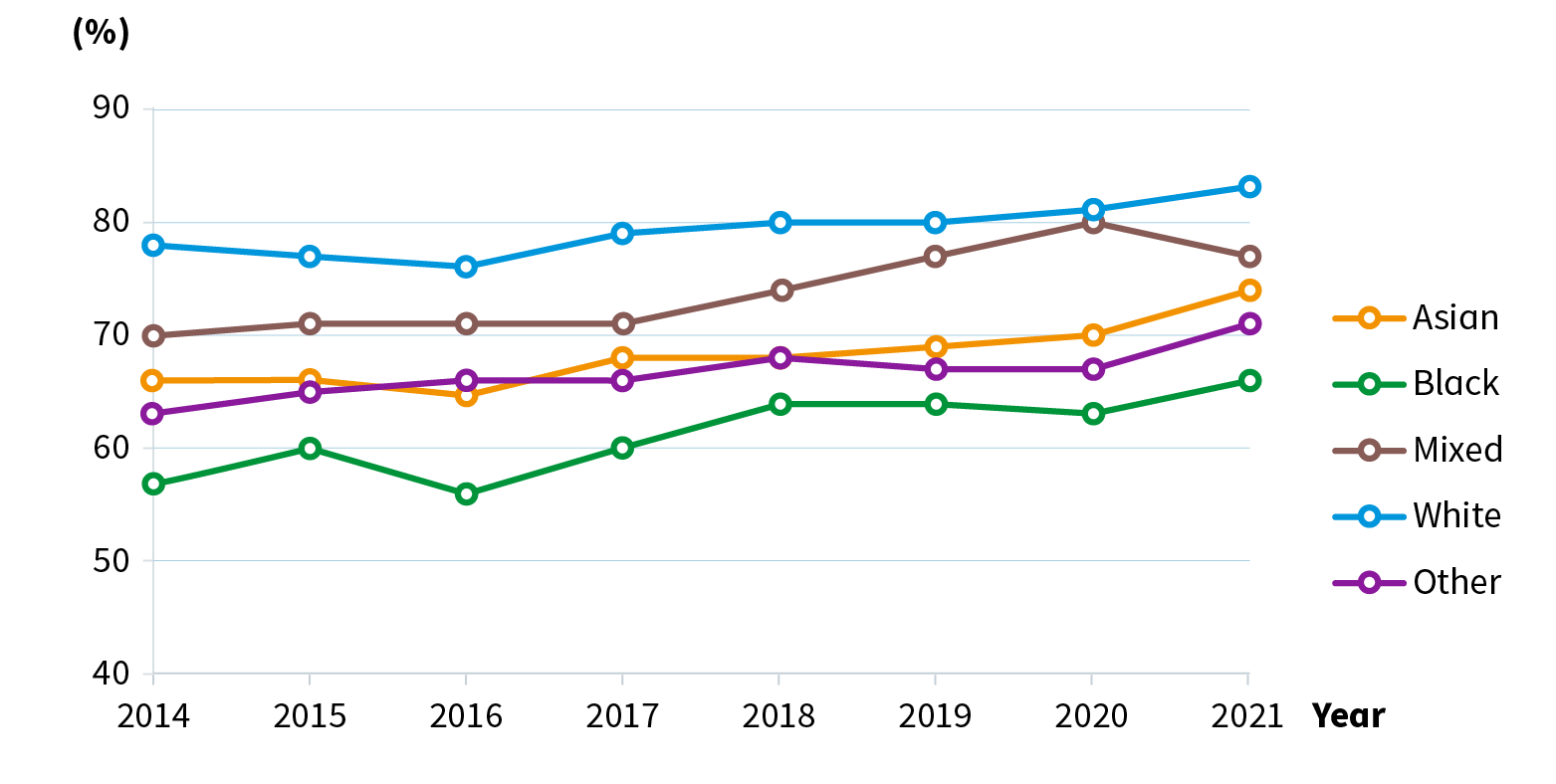Tackling differential attainment across the Scotland Deanery

The Advancing Equity in Medical Education Group (AEMEG)
The Advancing Equity in Medical Education Group (AEMEG) is a multi-stakeholder group within the Scotland Deanery. It consists of postgraduate deans, trainee representatives, university leads, directors of medical education, and equality, diversity and inclusion (EDI) experts. AEMEG’s aim is to reduce differential attainment in medical education among doctors in training in Scotland. To achieve this aim, AEMEG support, design, and deliver activities to create more inclusive working environments, that celebrate diversity and enable doctors in training to thrive.

What is differential attainment?
Differential attainment describes the gap in achievement between different groups of doctors undertaking the same assessment. Whilst differential attainment due to differences in ability is appropriate and expected, differential attainment that relates solely to gender, ethnicity, and other protected characteristics or demographics is not. A GMC report, in 2015, described differences in attainment by place of primary medical qualification, with UK graduates observed to pass postgraduate examinations over 70% of the time, compared to European Economic Area (EEA) and international medical graduates (IMGs) who passed less than 50% of the time. More recently, a 2023 GMC report highlighted differences in attainment across exams, ARCP outcomes, and recruitment success by ethnicity, religion, disability status, and socio-economic position. A sample of this data is presented in Figure 1.
Figure 1: Specialty exam pass rates for UK trained doctors by ethnic group, 2014-2021

Doctors n= 13,721 (2014); 13,739 (2015); 14,511 (2016); 14,565 (2017); 14,502 (2018); 14,688 (2019); 10,913 (2020); 16,049 (2021) "no information on ethnic group" removed
Source: GMC, Tackling disadvantage in medical education (2023)
Why does differential attainment occur?
Research dispels the myths of differential attainment being due to learner deficits and instead identifies causes within the learning environment. It highlights that individuals can be treated differently or disadvantaged based upon their protected characteristics or other demographics. For example, doctors who report problems fitting in at work can experience fewer learning opportunities and lower confidence. We also know that IMGs can face unique barriers related to visa difficulties, new working practices, and cultural differences when starting to work in the UK.
What are AEMEG doing to tackle differential attainment?
Due to the complexity of the issue, there is not a single quick fix. AEMEG have therefore developed a programme of activities that are structured around the five themes in the 2017 GMC report ‘Promoting excellence – equality and diversity considerations.’ These include considering equality and diversity in activities related to:
- Learning environment and culture
- Educational governance and leadership
- Supporting learners
- Supporting educators
- Developing and implementing medical school curricula and assessments
Table 1 provides an overview of the activities AEMEG have undertaken across these five themes.
Table 1: Summary of activities undertaken or supported by AEMEG between January 2021 and December 2022
GMC Theme 1 - Learning environment and culture
1. Integrate Equality, Diversity and Inclusion into Quality Management Activities
- To understand the experiences of doctors in training in relation to inclusive work and training environments, twelve new questions relating to equality, diversity and inclusion (EDI) issues were added to the Scottish Training Survey. The new version was issued to doctors in training in November 2022.
2. Improve how data is used to inform and evaluate work to celebrate diversity and to address differential attainment among doctors in training
- In 2021, an e-mail campaign to doctors in training was used to encourage the completion of equality and diversity information that is collected on Turas.
- Work is underway to ensure that equality and diversity questions on Turas are asked sensitively and that the information collected is useful. Updates to questions relating to sex, gender and place of primary medical qualification have been requested.
- An EDI Trainee Dashboard has been developed using the equality and diversity data information on Turas. This dashboard provides an overview of the demographic profile of doctors in training in Scotland and displays how Annual Review of Competence Progression (ARCP) and referrals to the Trainee Development and Wellbeing Service vary by protected characteristics and place of primary medical qualification. The dashboard will be used to support AEMEG’s work to understand and address differential attainment.
3. Promote inclusivity across all learning environments
A poster outlining five key themes to value diversity and promote inclusivity in the NHS workplace has been developed and disseminated to Health Boards for display in 2023. The five themes include:
- The need for active allyship
- Creating a sense of belonging
- Having role models/mentors/sponsors
- Valuing people as individuals
- Fostering compassionate cultures
GMC Theme 2 - Educational governance and leadership
4. Establish clear governance structures for AEMEG
- Governance structures ensure that AEMEG is accountable for their work to address differential attainment and help to embed EDI principles across the organisation. Within NES, AEMEG report to the Medical Directorate Senior Team. Externally, AEMEG report to the GMC.
5. Work in partnership with other stakeholders to achieve equality, diversity, and inclusion outcomes for doctors in training
- Collaborative working across all individuals and teams involved in medical education is required to address differential attainment. AEMEG has representation from NES’s Trainee Development and Wellbeing Service, the NES staff networks, NES’s Principal Lead for equality, diversity and human rights, NES’s senior disability specialist lead, the specialty training boards, Scottish medical schools, General Medical Council, Directors of Medical Education, Royal colleges, and British Medical Association. AEMEG also links to leaders in medical education elsewhere in the UK to learn from good practice and share ideas.
6. Develop an equitable process for appointing trainee representatives
- Trainee representatives are key to ensuring the that the voice of doctors in training contributes to work within the Scotland Deanery. A new, equitable process for appointing representatives has been developed and implemented within Training Management workstreams. It is hoped that this will be rolled out to other Scotland Deanery workstreams in the near future.
GMC Theme 3 - Supporting learners
7. Improve the orientation process for international medical graduates
8. Implement a buddy system for international medical graduates
9. Continue to develop, deliver and scale-up the Scottish Trainee Enhanced Programme
Under the leadership of the Associate Postgraduate Dean for international medical graduates (IMGs) and Directors of Medical Education, a range of national and local resources are available to support IMG doctors as they transition into work in NHS Scotland. These include:
- Pre-induction webinars run twice per year
- Interactive, virtual orientation days run twice per year
- The Scotland Deanery website has pages dedicated to IMG support
- A national Facebook group provides networking and support opportunities for IMG doctors across the whole of Scotland
- A buddy system links new IMG doctors with established medical staff who are working in the same geographical location
- In 2022, a welcome event for IMG doctors in the West of Scotland was held at the Royal College of Physicians and Surgeons of Glasgow
- The Scottish Trainee Enhanced Programme (STEP) delivers a course for IMG doctors and their supervisors. First set up for GP trainees, it has now been extended to psychiatry trainees (psychSTEP) and there are plans to roll out to other specialties including internal medicine, obstetrics & gynaecology, paediatrics, and surgery.
- At a local Health Board level, Directors of Medical Education have set up activities including bootcamps and simulation sessions
10. Explore the role of mentoring in promoting inclusivity
- Within GP training, a mentoring pilot is underway which pairs IMG GP trainees in their first year of training (mentees) to GP medical educators (mentors).
- A new reciprocal mentoring for inclusivity pilot is currently under development. With plans to launch in 2023, the pilot will pair doctors in training from under-represented groups with senior consultants and will encourage both participants to adopt the roles of mentor and mentee to enhance two-way learning.
11. Deliver active bystander training to all doctors in training in Scotland
- Active bystander training aims to support people to recognise and challenge unacceptable behaviours, including those which have become normalised over time. Funding has been provided to Directors of Medical Education to arrange active bystander training for all doctors in training over 2022/23 and 2023/24.
12. Redesign online NES equality, diversity and inclusion training to make it more relevant, interactive, and challenging
- A learning needs assessment with Health Board Equality and Learning & Development Leads was undertaken in 2022 to understand EDI learning needs. Work is now progressing to develop a ‘once for Scotland’ essential learning resource on Equality and Diversity and a cultural humility resource. Both will be available on the Turas Equality and Diversity Zone in 2023.
GMC Theme 4 - Supporting educators
13. Provide active bystander training to senior medical educators
14. Incorporate training for structured feedback into Scotland Deanery courses
- In 2021 active bystander training was offered to senior medical educators including Specialist and Associate Specialist Educators, Training Programme Directors, Directors of Medical Education, and all NES medical directorate staff.
- Training resources for trainers have been updated to include EDI elements.
15. Introduce a regular slot at training programme director events to discuss equality, diversity, and inclusion
16. Refresh annual review documents for medical educators to include consideration of supporting equity within trainer roles
- The Scotland Deanery have incorporated EDI as an agenda item into a number of areas. Examples include, EDI being introduced into the annual performance reviews of Training Programme Directors, and EDI topics being considered at training days for senior medical educators.
17. Develop and deliver training for structured feedback at ARCP panels
- A structured feedback framework for educational supervisors on the content and quality of their ARCP reports has been used in obstetrics & gynaecology, paediatrics, and diagnostic specialties to further standardise the ARCP review process.
18. Support trainers to support international medical gradates
- Resources have been developed to support supervisors and trainers of IMGs. These include the STEP programme which is open to supervisors, trainer webinars, and meeting frameworks which are available on the IMG pages of the Scotland Deanery website.
GMC Theme 5 - Developing and implementing medical school curricula and assessments
AEMEG is not directly involved in developing and implementing medical school curricula, but it works with colleagues in undergraduate medicine to understand and learn from the extensive activities that medical schools are taking to combat differential attainment. Understanding the experiences of students at an undergraduate level has also been key to anticipating the needs of doctors in training during postgraduate education and training.

Want to find out more?
Whilst AEMEG are immensely proud of their work, there is still much more to do. For further information on the work of AEMEG, please visit the AEMEG pages of the Scottish Deanery website. Or, for more specific information on the support available to IMGs and their trainers, please visit the IMG pages. If you have any questions, comments or would like to get involved, please do get in touch!

Dr Alice Harpur
Scottish Clinical Leadership Fellow, 2022-23
NHS Education for Scotland
alice.harpur@nhs.scot
Prof Clare McKenzie
Co-Chair AEMEG Group
NHS Education for Scotland

The Advancing Equity in Medical Education Group (AEMEG)
